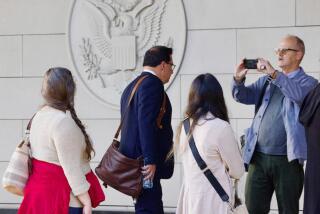Judge Denies Montoya Request to Stay Free During Appeal
- Share via
SACRAMENTO — A federal district court judge refused Thursday to allow former state Sen. Joseph B. Montoya to stay out of prison while appealing his conviction on political corruption charges.
But Judge Milton L. Schwartz said he would consider delaying the Whittier Democrat’s scheduled June 29 prison reporting date to give an appeals court time to decide whether Montoya should remain free pending appeal.
Faced with challenges to rulings he made while presiding over Montoya’s trial four months ago, Schwartz declared: “I would rule the same way on those questions today. . . .”
He said he saw “no justification” for allowing the ex-lawmaker to remain free while a higher court reviews Montoya’s appeal, but he acknowledged that the appeals court itself might decide otherwise.
Montoya did not appear in court. His attorney, Michael S. Sands, said that neither he nor another Montoya defense attorney, Bruce Kelton, would be representing Montoya in his appeal. “We don’t do appeals,” Sands said later.
Montoya was found guilty of seven counts of extortion, racketeering and money-laundering to become the first state legislator convicted of felony corruption in 35 years. Facing likely expulsion from the Senate, Montoya resigned.
Last month, Schwartz sentenced Montoya to 6 1/2 years in prison. The judge said he would recommend that Montoya serve his time at the minimum-security Lompoc Federal Penitentiary. Prosecutors have estimated that, under federal sentencing laws, Montoya will serve at least 5 1/2 years.
In arguing for a delay in Montoya’s imprisonment, Sands said that a number of Schwartz’s rulings during the trial could be overturned on appeal, resulting in a reversal of the conviction. For example, Schwartz--over the objections of Montoya’s attorneys--allowed the jury to hear a tape in which Sen. Alan Robbins (D-Tarzana) told an FBI informant that he would “need to make some arrangements with Joe” to assure Montoya’s support for a special-interest bill. Asked by the informant what was required for Montoya, Robbins says on the tape, “. . . a little envelope” and later “I would say about three ($3,000) would be sufficient.”
Prosecutors said that even if Schwartz erred in admitting the tape, the conviction would stand.
More to Read
Sign up for Essential California
The most important California stories and recommendations in your inbox every morning.
You may occasionally receive promotional content from the Los Angeles Times.











